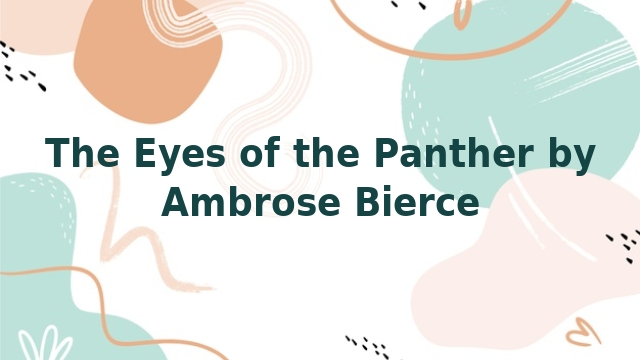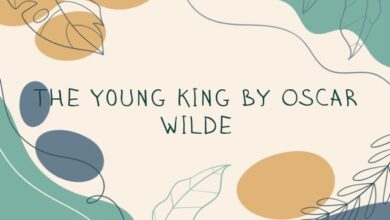
The Eyes of the Panther by Ambrose Bierce
Between our convictions and our feelings there is no good understanding.
I
ONE DOES NOT ALWAYS MARRY WHEN INSANE
A man and a woman–nature had done the grouping–sat on a rustic seat, in the late afternoon. The man was middle-aged, slender, swarthy, with the expression of a poet and the complexion of a pirate–a man at whom one would look again. The woman was young, blonde, graceful, with something in her figure and movements suggesting the word “lithe.” She was habited in a gray gown with odd brown markings in the texture. She may have been beautiful; one could not readily say, for her eyes denied attention to all else. They were gray-green, long and narrow, with an expression defying analysis. One could only know that they were disquieting. Cleopatra may have had such eyes.
The man and the woman talked.
“Yes,” said the woman, “I love you, God knows! But marry you, no. I cannot, will not.”
“Irene, you have said that many times, yet always have denied me a reason. I’ve a right to know, to understand, to feel and prove my fortitude if I have it. Give me a reason.”
“For loving you?”
The woman was smiling through her tears and her pallor. That did not stir any sense of humor in the man.
“No; there is no reason for that. A reason for not marrying me. I’ve a right to know. I must know. I will know!”
He had risen and was standing before her with clenched hands, on his face a frown–it might have been called a scowl. He looked as if he might attempt to learn by strangling her. She smiled no more–merely sat looking up into his face with a fixed, set regard that was utterly without emotion or sentiment. Yet it had something in it that tamed his resentment and made him shiver.
“You are determined to have my reason?” she asked in a tone that was entirely mechanical–a tone that might have been her look made audible.
“If you please–if I’m not asking too much.”
Apparently this lord of creation was yielding some part of his dominion over his co-creature.
“Very well, you shall know: I am insane.”
The man started, then looked incredulous and was conscious that he ought to be amused. But, again, the sense of humor failed him in his need and despite his disbelief he was profoundly disturbed by that which he did not believe. Between our convictions and our feelings there is no good understanding.
“That is what the physicians would say,” the woman continued–“if they knew. I might myself prefer to call it a case of ‘possession.’ Sit down and hear what I have to say.”
The man silently resumed his seat beside her on the rustic bench by the wayside. Over-against them on the eastern side of the valley the hills were already sunset-flushed and the stillness all about was of that peculiar quality that foretells the twilight. Something of its mysterious and significant solemnity had imparted itself to the man’s mood. In the spiritual, as in the material world, are signs and presages of night. Rarely meeting her look, and whenever he did so conscious of the indefinable dread with which, despite their feline beauty, her eyes always affected him, Jenner Brading listened in silence to the story told by Irene Marlowe. In deference to the reader’s possible prejudice against the artless method of an unpractised historian the author ventures to substitute his own version for hers.
II
A ROOM MAY BE TOO NARROW FOR THREE, THOUGH ONE IS OUTSIDE
In a little log house containing a single room sparely and rudely furnished, crouching on the floor against one of the walls, was a woman, clasping to her breast a child. Outside, a dense unbroken forest extended for many miles in every direction. This was at night and the room was black dark: no human eye could have discerned the woman and the child. Yet they were observed, narrowly, vigilantly, with never even a momentary slackening of attention; and that is the pivotal fact upon which this narrative turns.
Charles Marlowe was of the class, now extinct in this country, of woodmen pioneers–men who found their most acceptable surroundings in sylvan solitudes that stretched along the eastern slope of the Mississippi Valley, from the Great Lakes to the Gulf of Mexico. For more than a hundred years these men pushed ever westward, generation after generation, with rifle and ax, reclaiming from Nature and her savage children here and there an isolated acreage for the plow, no sooner reclaimed than surrendered to their less venturesome but more thrifty successors. At last they burst through the edge of the forest into the open country and vanished as if they had fallen over a cliff. The woodman pioneer is no more; the pioneer of the plains–he whose easy task it was to subdue for occupancy two-thirds of the country in a single generation–is another and inferior creation. With Charles Marlowe in the wilderness, sharing the dangers, hardships and privations of that strange, unprofitable life, were his wife and child, to whom, in the manner of his class, in which the domestic virtues were a religion, he was passionately attached. The woman was still young enough to be comely, new enough to the awful isolation of her lot to be cheerful. By withholding the large capacity for happiness which the simple satisfactions of the forest life could not have filled, Heaven had dealt honorably with her. In her light household tasks, her child, her husband and her few foolish books, she found abundant provision for her needs.
One morning in midsummer Marlowe took down his rifle from the wooden hooks on the wall and signified his intention of getting game.
“We’ve meat enough,” said the wife; “please don’t go out to-day. I dreamed last night, O, such a dreadful thing! I cannot recollect it, but I’m almost sure that it will come to pass if you go out.”
It is painful to confess that Marlowe received this solemn statement with less of gravity than was due to the mysterious nature of the calamity foreshadowed. In truth, he laughed.
“Try to remember,” he said. “Maybe you dreamed that Baby had lost the power of speech.”
The conjecture was obviously suggested by the fact that Baby, clinging to the fringe of his hunting-coat with all her ten pudgy thumbs was at that moment uttering her sense of the situation in a series of exultant goo-goos inspired by sight of her father’s raccoon-skin cap.
The woman yielded: lacking the gift of humor she could not hold out against his kindly badinage. So, with a kiss for the mother and a kiss for the child, he left the house and closed the door upon his happiness forever.
At nightfall he had not returned. The woman prepared supper and waited. Then she put Baby to bed and sang softly to her until she slept. By this time the fire on the hearth, at which she had cooked supper, had burned out and the room was lighted by a single candle. This she afterward placed in the open window as a sign and welcome to the hunter if he should approach from that side. She had thoughtfully closed and barred the door against such wild animals as might prefer it to an open window –of the habits of beasts of prey in entering a house uninvited she was not advised, though with true female prevision she may have considered the possibility of their entrance by way of the chimney. As the night wore on she became not less anxious, but more drowsy, and at last rested her arms upon the bed by the child and her head upon the arms. The candle in the window burned down to the socket, sputtered and flared a moment and went out unobserved; for the woman slept and dreamed.
In her dreams she sat beside the cradle of a second child. The first one was dead. The father was dead. The home in the forest was lost and the dwelling in which she lived was unfamiliar. There were heavy oaken doors, always closed, and outside the windows, fastened into the thick stone walls, were iron bars, obviously (so she thought) a provision against Indians. All this she noted with an infinite self-pity, but without surprise–an emotion unknown in dreams. The child in the cradle was invisible under its coverlet which something impelled her to remove. She did so, disclosing the face of a wild animal! In the shock of this dreadful revelation the dreamer awoke, trembling in the darkness of her cabin in the wood.
As a sense of her actual surroundings came slowly back to her she felt for the child that was not a dream, and assured herself by its breathing that all was well with it; nor could she forbear to pass a hand lightly across its face. Then, moved by some impulse for which she probably could not have accounted, she rose and took the sleeping babe in her arms, holding it close against her breast. The head of the child’s cot was against the wall to which the woman now turned her back as she stood. Lifting her eyes she saw two bright objects starring the darkness with a reddish-green glow. She took them to be two coals on the hearth, but with her returning sense of direction came the disquieting consciousness that they were not in that quarter of the room, moreover were too high, being nearly at the level of the eyes–of her own eyes. For these were the eyes of a panther.
The beast was at the open window directly opposite and not five paces away. Nothing but those terrible eyes was visible, but in the dreadful tumult of her feelings as the situation disclosed itself to her understanding she somehow knew that the animal was standing on its hinder feet, supporting itself with its paws on the window-ledge. That signified a malign interest–not the mere gratification of an indolent curiosity. The consciousness of the attitude was an added horror, accentuating the menace of those awful eyes, in whose steadfast fire her strength and courage were alike consumed. Under their silent questioning she shuddered and turned sick. Her knees failed her, and by degrees, instinctively striving to avoid a sudden movement that might bring the beast upon her, she sank to the floor, crouched against the wall and tried to shield the babe with her trembling body without withdrawing her gaze from the luminous orbs that were killing her. No thought of her husband came to her in her agony–no hope nor suggestion of rescue or escape. Her capacity for thought and feeling had narrowed to the dimensions of a single emotion–fear of the animal’s spring, of the impact of its body, the buffeting of its great arms, the feel of its teeth in her throat, the mangling of her babe. Motionless now and in absolute silence, she awaited her doom, the moments growing to hours, to years, to ages; and still those devilish eyes maintained their watch.
Returning to his cabin late at night with a deer on his shoulders Charles Marlowe tried the door. It did not yield. He knocked; there was no answer. He laid down his deer and went round to the window. As he turned the angle of the building he fancied he heard a sound as of stealthy footfalls and a rustling in the undergrowth of the forest, but they were too slight for certainty, even to his practised ear. Approaching the window, and to his surprise finding it open, he threw his leg over the sill and entered. All was darkness and silence. He groped his way to the fire-place, struck a match and lit a candle.
Then he looked about. Cowering on the floor against a wall was his wife, clasping his child. As he sprang toward her she rose and broke into laughter, long, loud, and mechanical, devoid of gladness and devoid of sense–the laughter that is not out of keeping with the clanking of a chain. Hardly knowing what he did he extended his arms. She laid the babe in them. It was dead–pressed to death in its mother’s embrace.
III
THE THEORY OF THE DEFENSE
That is what occurred during a night in a forest, but not all of it did Irene Marlowe relate to Jenner Brading; not all of it was known to her. When she had concluded the sun was below the horizon and the long summer twilight had begun to deepen in the hollows of the land. For some moments Brading was silent, expecting the narrative to be carried forward to some definite connection with the conversation introducing it; but the narrator was as silent as he, her face averted, her hands clasping and unclasping themselves as they lay in her lap, with a singular suggestion of an activity independent of her will.
“It is a sad, a terrible story,” said Brading at last, “but I do not understand. You call Charles Marlowe father; that I know. That he is old before his time, broken by some great sorrow, I have seen, or thought I saw. But, pardon me, you said that you–that you–“
“That I am insane,” said the girl, without a movement of head or body.
“But, Irene, you say–please, dear, do not look away from me–you say that the child was dead, not demented.”
“Yes, that one–I am the second. I was born three months after that night, my mother being mercifully permitted to lay down her life in giving me mine.”
Brading was again silent; he was a trifle dazed and could not at once think of the right thing to say. Her face was still turned away. In his embarrassment he reached impulsively toward the hands that lay closing and unclosing in her lap, but something–he could not have said what– restrained him. He then remembered, vaguely, that he had never altogether cared to take her hand.
“Is it likely,” she resumed, “that a person born under such circumstances is like others–is what you call sane?”
Brading did not reply; he was preoccupied with a new thought that was taking shape in his mind–what a scientist would have called an hypothesis; a detective, a theory. It might throw an added light, albeit a lurid one, upon such doubt of her sanity as her own assertion had not dispelled.
The country was still new and, outside the villages, sparsely populated. The professional hunter was still a familiar figure, and among his trophies were heads and pelts of the larger kinds of game. Tales variously credible of nocturnal meetings with savage animals in lonely roads were sometimes current, passed through the customary stages of growth and decay, and were forgotten. A recent addition to these popular apocrypha, originating, apparently, by spontaneous generation in several households, was of a panther which had frightened some of their members by looking in at windows by night. The yarn had caused its little ripple of excitement–had even attained to the distinction of a place in the local newspaper; but Brading had given it no attention. Its likeness to the story to which he had just listened now impressed him as perhaps more than accidental. Was it not possible that the one story had suggested the other–that finding congenial conditions in a morbid mind and a fertile fancy, it had grown to the tragic tale that he had heard?
Brading recalled certain circumstances of the girl’s history and disposition, of which, with love’s incuriosity, he had hitherto been heedless–such as her solitary life with her father, at whose house no one, apparently, was an acceptable visitor and her strange fear of the night, by which those who knew her best accounted for her never being seen after dark. Surely in such a mind imagination once kindled might burn with a lawless flame, penetrating and enveloping the entire structure. That she was mad, though the conviction gave him the acutest pain, he could no longer doubt; she had only mistaken an effect of her mental disorder for its cause, bringing into imaginary relation with her own personality the vagaries of the local myth-makers. With some vague intention of testing his new “theory,” and no very definite notion of how to set about it he said, gravely, but with hesitation:
“Irene, dear, tell me–I beg you will not take offence, but tell me–“
“I have told you,” she interrupted, speaking with a passionate earnestness that he had not known her to show–“I have already told you that we cannot marry; is anything else worth saying?”
Before he could stop her she had sprung from her seat and without another word or look was gliding away among the trees toward her father’s house. Brading had risen to detain her; he stood watching her in silence until she had vanished in the gloom. Suddenly he started as if he had been shot; his face took on an expression of amazement and alarm: in one of the black shadows into which she had disappeared he had caught a quick, brief glimpse of shining eyes! For an instant he was dazed and irresolute; then he dashed into the wood after her, shouting: “Irene, Irene, look out! The panther! The panther!”
In a moment he had passed through the fringe of forest into open ground and saw the girl’s gray skirt vanishing into her father’s door. No panther was visible.
IV
AN APPEAL TO THE CONSCIENCE OF GOD
Jenner Brading, attorney-at-law, lived in a cottage at the edge of the town. Directly behind the dwelling was the forest. Being a bachelor, and therefore, by the Draconian moral code of the time and place denied the services of the only species of domestic servant known thereabout, the “hired girl,” he boarded at the village hotel, where also was his office. The woodside cottage was merely a lodging maintained–at no great cost, to be sure–as an evidence of prosperity and respectability. It would hardly do for one to whom the local newspaper had pointed with pride as “the foremost jurist of his time” to be “homeless,” albeit he may sometimes have suspected that the words “home” and “house” were not strictly synonymous. Indeed, his consciousness of the disparity and his will to harmonize it were matters of logical inference, for it was generally reported that soon after the cottage was built its owner had made a futile venture in the direction of marriage–had, in truth, gone so far as to be rejected by the beautiful but eccentric daughter of Old Man Marlowe, the recluse. This was publicly believed because he had told it himself and she had not–a reversal of the usual order of things which could hardly fail to carry conviction.
Brading’s bedroom was at the rear of the house, with a single window facing the forest.
One night he was awakened by a noise at that window; he could hardly have said what it was like. With a little thrill of the nerves he sat up in bed and laid hold of the revolver which, with a forethought most commendable in one addicted to the habit of sleeping on the ground floor with an open window, he had put under his pillow. The room was in absolute darkness, but being unterrified he knew where to direct his eyes, and there he held them, awaiting in silence what further might occur. He could now dimly discern the aperture–a square of lighter black. Presently there appeared at its lower edge two gleaming eyes that burned with a malignant lustre inexpressibly terrible! Brading’s heart gave a great jump, then seemed to stand still. A chill passed along his spine and through his hair; he felt the blood forsake his cheeks. He could not have cried out–not to save his life; but being a man of courage he would not, to save his life, have done so if he had been able. Some trepidation his coward body might feel, but his spirit was of sterner stuff. Slowly the shining eyes rose with a steady motion that seemed an approach, and slowly rose Brading’s right hand, holding the pistol. He fired!
Blinded by the flash and stunned by the report, Brading nevertheless heard, or fancied that he heard, the wild, high scream of the panther, so human in sound, so devilish in suggestion. Leaping from the bed he hastily clothed himself and, pistol in hand, sprang from the door, meeting two or three men who came running up from the road. A brief explanation was followed by a cautious search of the house. The grass was wet with dew; beneath the window it had been trodden and partly leveled for a wide space, from which a devious trail, visible in the light of a lantern, led away into the bushes. One of the men stumbled and fell upon his hands, which as he rose and rubbed them together were slippery. On examination they were seen to be red with blood.
An encounter, unarmed, with a wounded panther was not agreeable to their taste; all but Brading turned back. He, with lantern and pistol, pushed courageously forward into the wood. Passing through a difficult undergrowth he came into a small opening, and there his courage had its reward, for there he found the body of his victim. But it was no panther. What it was is told, even to this day, upon a weather-worn headstone in the village churchyard, and for many years was attested daily at the graveside by the bent figure and sorrow-seamed face of Old Man Marlowe, to whose soul, and to the soul of his strange, unhappy child, peace. Peace and reparation.





